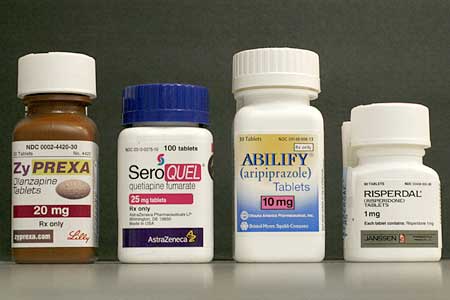The Dallas Morning News
Legislation requires doctors to get state permission before prescribing psychiatric drugs for kids on Medicaid
April 1, 2009
AUSTIN – The number of poor Texas children on powerful psychiatric drugs could drop dramatically under a bill lawmakers are considering to halt unwarranted prescriptions.
Rep. Sylvester Turner’s bill would prohibit doctors from prescribing anti-psychotic drugs to children younger than 11 who are covered by Medicaid unless they get special permission from the state.
Drug companies and medical professionals fear the measure would take control out of the hands of doctors and parents.

Thousands of Texas children under 2 years old have been prescribed anti-psychotics like Seroquel and Risperdal, Turner said – drugs that treat schizophrenia and bipolar disorder, but can produce harmful side effects in children. His measure would force state health officials to review individual prescriptions, considering a child’s diagnosis and whether a drug has federal approval for use in juveniles before approving the prescription.
“I’m not here to disparage drug companies, but as the guardian of these children we need to be careful in allowing these drugs to be given to kids unless there are some sort of basic minimum standards,” said Turner, D-Houston. “All I ask is that … we’re not giving them drugs at a higher level than what they should be receiving.”
The drug industry, medical professionals, and mental health organizations staunchly oppose Turner’s bill. They say it strips oversight and expertise from parents and doctors and adds a layer of bureaucracy that could prevent poor children from getting mental health treatment.
The bill “interferes with the practice of medicine and the actions of parents out there who have taken care of their kids,” said Steve Bresnen, lobbyist for the Federation of Texas Psychiatry.
Some question whether the state can afford the manpower to review so many prescriptions, but lawmakers predict the measure will save the state money overall by reducing the number of expensive prescriptions filled.
Hattie McGill didn’t want her 8-year-old on anti-psychotic drugs. But when his psychological problems got so severe that he wouldn’t sleep and she couldn’t work, the Waco single mom took him to a doctor that accepted Medicaid.
Over the next four years, her son was found to have bipolar disorder, attention deficit disorder, seizure disorder and anxiety disorder and prescribed Abilify, Ritalin, Concerta, and Seroquel. Now 12, McGill’s son weighs 240 pounds, a side effect of the anti-psychotic drugs that makes him even more depressed.
“I look at what they’ve done to him,” said McGill, who has slowly weaned her son off all of the drugs but Seroquel. “But on the other hand, if you have a sick son and he needs the help, will it be available?”
According to state data, roughly 13 percent of the 2.1 million children on Medicaid received a psychotropic drug in fiscal 2007. Nearly 190,000 of those kids were younger than 11.
Turner said he knows some children benefit from these drugs, and he isn’t trying to hamstring families. Nor does his bill ban off-label prescribing of drugs not federally approved for children – of which Seroquel is one. He said he’s trying to make doctors think twice before prescribing powerful drugs to very young children.
A House committee is considering Turner’s measure, and members seemed to embrace the idea in a recent hearing.
A 2008 Dallas Morning News study found one in three Texas foster children was found to have mental illness and prescribed psychiatric drugs, including some not federally approved for juveniles. The News found dozens of physicians treating children in state custody supplement their salaries with tens of thousands of dollars in consulting and speakers’ fees, raising questions about motivations to prescribe psychotropic drugs.
“I’m not a doctor. I’m not here to say these medications should not be given,” Turner said. “I just want to make sure we’re not in a situation where we’re providing them because it’s expedient to provide them.”
Lynn Lasky Clark, president of the nonprofit Mental Health America of Texas, said Turner’s measure would unfairly force people with mental disorders to jump through hoops to be treated.
“It interferes with a parent’s right to choose what kind of medication their children will take,” she said. “Families and doctors will have a terrible time trying to access needed medications for children who are very ill.”
Last year, Florida health officials began requiring state approval for Medicaid recipients younger than 6. Since then, the number of antipsychotic prescriptions written for preschoolers in the state dropped by nearly 75 percent, and 200 doctors stopped prescribing to them all together. Health officials believe the program has been a great success, but some doctors have said their patients are suffering or have had refills delayed.
Rep. Veronica Gonzales, D-McAllen, said at a committee hearing last week that she fears Texas health officials won’t have enough staff to perform individual assessments on every child on Medicaid that needs an anti-psychotic drug.
“I just worry we’re going to have people not getting the medication they do need because the department doesn’t have the time or resources,” she said.
Link to story: http://www.dallasnews.com/sharedcontent/dws/news/texassouthwest/stories/DN-psychdrugs_01tex.ART0.State.Edition2.4ac00bc.html

